|
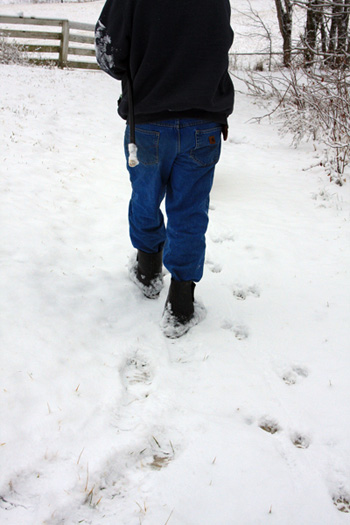
Making tracks, human and canine, together.
(*photo credit)
February 1, 2011
Review Our American Freedoms
Challenge: Are our
national freedoms threatened?
Annually, we celebrate
National Freedom Day. We can become somewhat blase' about our fragile
freedom for it can be lost by lack of vigilance. Freedom may be threatened: a
Moslem community is denied a permit to build its place of worship; migrants are
imprisoned for illegally crossing the border and have little means for legal
counsel; homeowners suffer from invalid foreclosure procedures; the unemployed
cannot move elsewhere because a home is "under water" with mortgage payments;
small store operators pay a local gang for protection; youth are bullied by
schoolmates; the unemployed are convinced that they have a "right to work;"
middle managers are forced to teach foreigners how to perform their soon to be
outsourced-jobs; the unjustly accused on Facebook have little recourse to
refutation.
Who
knows how many such examples can be brought up in this "land of the free and the
brave"? In some ways the globalization, broadened information retrieval,
dumbing down of the media, instant sound bites, invasion of privacy, erosion of
civility and respect, and a host of other causes threaten our cherished
freedoms. Gone are the days when someone in financial or social trouble could
pick up and move to another state and start over again. This inability to start
afresh is actually a severe restriction on human freedom.
Yes,
our precious freedoms can be spelled out more easily than they can be protected
over a long period. Each of us attempts to live our lives and yet barriers
exist, many of which we are simply unaware of until we bump into them. We break
a parking rule; we find that a credit card has the high interest rates listed in
the very fine print; we run into opposition from a mean person wanting to own
something we possess. While some today call for less government, that condition
certainly does not guarantee more freedom for all, but rather more risks of
seeing our precious heritage eroded by the unscrupulous few. Our busy lives
demand protection from those who seek ways of taking advantage of us. By asking
how we can protect what we have, are we becoming alerted to the dangers that
threaten our fragile freedoms?
We
need a sense of respect born in sincere religious practice and loving service to
and with others. Non-social "spirituality" leads to isolation and overbearing
self-interest that closes out relationships of respect. Authentic freedom means
giving others space needed to conduct their affairs in life. Over pressure to
conform to secular norms of conduct, from lawn-grass size to how we fix our
hair, all may threaten freedom in some way. So do the mega-rich who spend
immense untaxed sums to buy public influence and make rules for retaining their
wealth. Freedom requires an atmosphere of respect for the common good for all
citizens.
Prayer:
Loving God, teach us to be free before you, and to protect the freedoms of all
around us as a service of love.

Gene and Sue, devoted friends.
(*photo credit)
February 2, 2011 Expose
the Obscenity of Wealth
Challenge: Does
excessive wealth erode the spirit?
Do
today's secular Groundhog Day and religious Candlemas Day have
something in common? Emerging from darkness necessitates seeing the light, or
an exposure. We need eyes and light to see.
Wealth
grasped tightly can bring eternal condemnation. Jesus says it is harder for
a rich man to attain the kingdom than for a camel to pass through the eye of a
needle. We ask ourselves how we interpret this in a pervasive capitalistic
culture, which gives honor to those who have acquired wealth? Our answers
reflect our values. Are we for Jesus or not? Besides the wealth leading to
loss of salvation -- good reason in itself, why ought we to look beyond the
personal choice of the wealthy to retain their property?
Wealth
unopposed breeds anarchy. In order for the wealthy to retain their
possessions, legally or ill-gotten, they are moved to influence governmental
procedures that lower their taxes and sustain their position. Thus they
champion a "sustainability" of the status quo when the world has changed and the
chasm of disparity between wealth and poverty is so immense. Globalization
means rapid transfer of wealth among nations, and this leads to vast
accumulation of money and power unheard of a few decades ago. When unchecked,
governmental systems break down and entire nations are at the mercy of wealthy
individuals and corporations.
Wealth
politically-used is fundamentally anti-democratic. Ben Franklin sensed this
at the start of the Republic -- and rightly so. Putting caps on the wealthy
would allow for a broader base of participation and does not allow undue
influence on the part of the privileged few by whatever name or circumstance.
For championing democracy and the voice of the people means we must contain and
limit wealth to moderate means. Believing that the wealthy make better
investors has no economic or historic sense -- only a working myth that is
utterly undemocratic in practice.
Wealth
uncontrolled is toxic. Our planet cannot sustain the extravagances of
hundreds of millions trying to imitate the wealthy with spacious homes,
multi-layers of energy hungry appliances and technological gimmicks, private
vehicles and roads and parking for all, recreational boats and planes, and all
the travel that such wealth encourages. Uncontrolled wealth for luxurious
living endangers our planet. Added perversity is that the blame is placed on
the poor who need fuel, and thus cut precious trees for charcoal in Haiti and
parts of Africa. Instead of seeing the horror of uncontrolled consumption, the
economies of many "developed" countries create tax credits and incentives to
allow for expanded higher lifestyles to stimulate the economy.
Prayer:
Holy Spirit, help us to spread the Good News that the commons is better served
through equality of wealth and sharing of resources with those who have greater
needs.

Kentucky in black and white.
(*photo credit)
February 3, 2011 Enjoy
"Appalachian Winter"
Challenge: How do we
maintain our spirits in winter?
This
is the midpoint of winter today and so we need to resolve to make the best of
this season.
APPALACHIAN WINTER
Sing of spring, simmer
in summer, enthrall in fall,
Brave souls enter and
enjoy Appalachian winter.
Unclothed mid-year's greenery, bare-breasted knobs,
Naked landscape,
stripped, clearcut, littered over.
The countryside reveals a million shades of gray:
Farm ponds, tulip
tree bark, briar patches,
Swinging bridges, grape vines, dried goldenrod butts,
Icicles hanging from
north slope roadcuts.
Squealing playgrounds of vanishing snow patches,
Just before the rare
sun transforms the landscape.
A jumble of intertwined curvy graveled roads
without shoulders
and with no distinguishing codes.
The
squat barns sit on coved in hillsides
hunkered down like
contented nesting hens before.
Some
roadside plots show last year's tobacco stumps,
Amid green sprigged
winter wheat and rye.
Hay rolls punctuate the livestock fields,
picked at by scruffy
heifers or old plugs
who earn their
retirement where they were born.
And there's manure piled
knee-deep, shed filled,
partly composting,
left to March and windy climes.
If you like black and
white photos,
with many shades of
gray,
You'll love Appalachian
Winter.

Wintry scene offers vivid colors of nature.
(*photo credit)
February 4, 2011
Witness to Needed Religion in Earthhealing
Challenge:
Is a spiritual life that lacks religion sufficient?
A
balanced economy and social equality demand the basis of a religious culture
that strives to permit freedom for all. We are aware that intolerance among a
variety of so-called religionists with shootings and bombings is no answer.
Violence breeds further violence. Nor is an oppressive secular or atheistic
world more inviting as we know from the Stalinist era. Tolerant religion with
its public manifestation of spiritual values as a community trust is absolutely
necessary and is foundational to social progress.
A
"spiritual life" is lifeless without religion. The first reason is that
religion encourages civility and respect within a culture. Experts tell
us that those who engage in regular religious practice are known to be more
involved in civic affairs and public spirited. This is not a coincidence.
Religious people feel a sense of responsibility, that is, responding to the God
(with different names) Who calls. Believers respond through prayerful
communication with Another, and this becomes something real and encompasses
those within a believing community.
The
second aspect is the prophetic witness of religious life. It is not easy
and it is quite risky to be prophetic. We are best able to act when reinforced
by a prayerful religious community that knows what is really happening.
Religion, or acknowledgment of our condition before God, allows us to see the
HERE and NOW, the where in place and the when in time. Awareness of situations
and seasons is enhanced by a sense of togetherness, a WE, a community that
exposes our strengths and weaknesses. The prophetic is the spirit at work
within community, not moving us always (though sometimes) in a singular
fashion. Prophets publicly speak the bald truth.
The
third aspect of religion utterly needed today is encouragement of others
in community through compassion. We all must take special steps to avoid
burning out and to experience the pain of others nearing burnout as well. A
believing community gives witness to our strengths and weaknesses, and these can
become self-revealing. Affluence leads to insensitivity, and religion calls us
back to what is important. Without it, the unhealthy condition of luxury
spreads like an epidemic. Spiritual health involves the public concern for the
health of each other and the need to be sensitive to their needs. That includes
an effort to curtail extravagance for the good of all.
The
fourth element of a loving religious people is the need to bring unity
among people. God called the Israel community of old in the worship of ONE
God. The chosen people were to introduce a unity in belief to a world of Babel
that was divided and fractured. Unfortunately, rigid interpretations have led
to sectarian fights.
Prayer:
Lord, inspire us to show respect, give prophetic witness, exhibit
compassion, and help establish unity among all.

Photo of deer, taken with backyard automatic game camera.
(*photo credit)
February 5, 2011 Champion
Health through Nature Experiences
Challenge:
How can we experience nature in a wholesome way?
We need to be near nature,
but tightening educational budgets threatens this. Cuts in discretionary
funding involve curbs in experiencing nature because of reduced transport
subsidies for visits to nature preserves and centers. Such reductions seldom
consider the hidden benefits of human health and well-being triggered by love of
nature. One need not hunt to enjoy wildlife.
1.
Nature Center experiences. Certain places attempt to concentrate the
natural experiences for the education of natives and visitors at great
distances. The Mary E. Fritsch Nature Center at Livingston, Kentucky,
seeks to give a nature experience to youth and others in the region. This is
done by placing unique value on native trees, flowers and wildlife of the
immediate surroundings, the Mixed Mesophytic Forest. This sense of value
is meant to lead to a respect for the priceless environment that is threatened
through off-road vehicle damage and wood and coal extraction.
2.
Nature immersion experiences. A summer spent in nature with few
possibilities of flush toilets and fast foods may be a memorable experience, if
one is prepared to live in such circumstances. In 1687, the explorer Robert
Cavelier de La Salle, led colonists destined to colonize a site at the mouth of
the Mississippi. Unfortunately, their ships got lost and landed in Texas -- a
sad story of people with no preparation and unable to survive well in a strange
wilderness. However, with good leadership and sufficient preparations natural
experiences can be positive, and can build self-confidence and survival skills.
3.
Backyard experiences. The camp-outs by kids near home could be the start
of long-term nature experiences of outdoors and fresh air, and an association
with the sights and sounds of nocturnal life. Fear is dispelled and the
invitation to do more is never too far away. Likewise those who invite and
entice wildlife on a limited basis (songbirds and squirrels perhaps) get great
enjoyment that adds to their well-being and mental health.
4.
Wildlife experiences at home. Facing the budget tightening condition
means alternatives are sought. The vicarious nature experience is perfect for
shut-ins and those who are immobile. One answer is the multitude of printed
materials in libraries and through periodicals, the videotapes and films on
television or at- home VCRs, and the lectures and slide shows of organized
classes. The informational range is vast and growing; readers of National
Geographic or those who view environmental films approach visually though at
a distance. Nature observers practice good ecology; while this is not like
being there, distance experience does not disturb wildlife, damage landscape or
leave a carbon footprint.
Prayers:
Lord, help us to enjoy good health and to see that part of being healthy is by
becoming more nature-loving.

Sparkling ice in winter's sun.
(*photo credit)
February 6, 2011
Lighten up the World
You are the light of the
world. (Matthew 5:13)
Challenge: How can we
enlighten a world of shadows?
During this part of winter
we are keenly aware that the span of daylight is expanding. God is the source
of all light and, in the liturgical readings today, we are asked to become
lights to the world, a challenge that could take a lifetime to achieve.
Enlighten by teaching.
The Big Bang was an initial moment of light's beginning. God said "let there
be light" and there was light. And God saw that light was good, and God divided
light from darkness (Genesis 1:3). As author of all light, God truly is
our source of physical and spiritual energy. Physical light is a part of our
mortal life for we all need light to perform our work. We utilize artificial
light for signals, road markers, illumination in our interior living space, and
for a multitude of operations. We know this need when electricity is "shut off"
for even a brief period. Light gives us a sense of security; light triggers the
photosynthetic process of the plants for food and shade; light warms, heals, and
enlightens. Our dependence on light is ever present to us.
Enlighten through
healing. Then your light shall break forth like the dawn, and your wound
shall quickly be healed; your vindication shall go before you, and the
glory of the Lord shall be your rear guard (Isaiah 58:8). Christ is our
spiritual source, our lamp rolling back the darkness of our self-created
shadows, our way or lighthouse that guides our journey of faith. Christ, our
light, enlivening us to perform noble deeds; he is the light we need for healing
and refreshment of our bodies. The rays of Christ's light produce a greenhouse
effect within us, light transformed into a heart-warming energy, a love meant to
help serve others.
Enlighten through being
models to others. Just so, your light must shine before others, that
they may see your good deeds and glorify your heavenly Father (Matthew
5:16). Christ transfers light to us in a special way: we become other Christs
to the world around us through the graces of our Baptism and Confirmation. We
are not just mirrors of Christ, but we enliven as in the photosynthetic
process; we guide others; we furnish a lamplight through which those who have
been in darkness can now have their way illuminated, so they can walk in the
light of faith.
Cultivate
light-heartedness. To lighten up is a good reminder during February's
dreariness. Spread some laughter; find a way to make others enjoy what we say.
Cultivate humor, for that inspires others. Being light-hearted has a serious
quality, for it gives courage to others and allows them to grow in self-esteem.
Using humor is one way to enlighten an overly somber world.
Prayer:
Teach us, Lord, how to be lights to others.
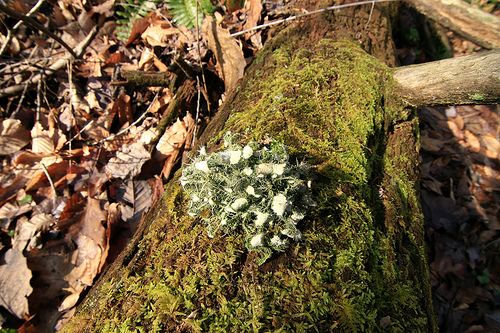
Proliferating mosses on decomposing log. Slade, KY.
(*photo credit)
February 7, 2011
Acquire a Rocking Chair and Use It
Challenge:
How can we rest when rest is needed?
The
senior who says, "Sometimes I sits and thinks and sometimes I just sits" tells
us something important. Maybe a little rocking and enjoying body movement
without changing basic location is rest as well. The perfect instrument for
such an undertaking is the rocking chair, which I recently discovered. The
swinging motion is perfectly calming and still allows for reflection and
reading.
Rocking
chairs have a recent history though some archeologist may unearth one buried
away some day. Some say Ben Franklin (1706-90) was the inventor, but did he
spend that much time rocking? Furthermore, he was a youth in 1725 when England
was rocking with these chairs. Let's concede the instrument to the English; the
"Windsor Rocker " was popular near Windsor Castle by the 1740s. However, by
that time the Swedes had the Gungstol (a six-legged device) and other
models soon followed. By the 1820s the rocking chair gained fashion in America
with such models as the Shaker Rocker (generally of cherry wood and with
a woven bark or tape seat); these were popular products of craftmen in the
United Society of Believers, or Shakers. Light-weight Wicker Rockers
became widespread somewhat before the Civil War. Adirondack and Appalachian
crafters created a variety of designs from local materials throughout the
nineteenth century and beyond.
Rocking
chairs reduce stress and permit relaxation. The rocking chair is a natural
compromise -- movement and sitting in one place. While sitting in an auto
allows mobility from place to place, a rocking chair never changes basic
location while still allowing motion in place, much as horseback riding -- and
this is relaxing for few rocking-chair travel accidents occur.
Acquiring the perfect chair may
be a hit-and-miss operation. So many want a soft model, a silent one, a sturdy
one, or one made from certain wood or fiber seating and backing. The
possibilities allow for variety and a broad price range. Some rockers are
antiques, but who wants to use a costly artifact? Rockers can be popular with
parent and infant, and with elders in retirement, or the middle aged in serious
or easy conversation. Our choices depend on where we are and how we want to
rest. Unused rockers are out there at garage and yard sales, so be on the
lookout for a bargain. Rocking is an exercise that is easy to master, for it
requires only shifting body weight and/or using the feet with a small pushing
motion. Taking time to rock may be the important decision once the instrument
is acquired. You may like it alone or along with others, for reflecting or
listening or conversing. Sometimes a creaking rocking chair is welcome; in
other times we like the silence of the particular rocking chair.
Prayer:
Lord, teach us to enjoy a rest even in times of busy activity. Allow us the
instruments we need to give us this rest.

Icy coatings on winter foliage.
(*photo credit)
February 8, 2011
Disparity of Wealth and the Environmental Crisis
Challenge: Can we curb
the ever-expanding disparity of wealth?
In
the last two decades the super rich 1% of Americans increased their holding from
10% to 23% of total national wealth. Our disparity surpasses that of any other
developed nation and is growing. We fail to see is that this disparity in what
is acquired and retained adds to the troubles of our world, causing insecurity
and discontent. Some preachers counsel patience and hint that our discontent is
based on the sin of envy. However, we must confront those who seek the status
quo and challenge them to rethink the current situation. Excessive wealth is an
abomination, a perversion of power as the privileged seek to control our world.
Perversity
affects our environment. Those who are rapidly entering the middle class of the
world (perhaps 400 million in China alone in this decade) have the same
aspirations to retain and freely use resources as do the very wealthy. The
rising demand for energy and water among this emerging class springs from these
aspirations. Physical materials, from cars and fuel to housing and appliances,
are in ever greater demand. Such place an ever heavier demand on our limited
total environment. Material wants are insatiable -- and a consumer economy with
its allurements feeds on just such addiction-generating appetites for more
goods.
Disparity
of wealth leads to the great majority wanting these privileges as well, for they
see them in store windows and on TV. Seeking necessities for decent food or
housing is one thing, but that is not where dispensable wealth is directed.
Those who "want" in place of "need" have money to spend, and so promotion is
directed to them -- the upper and middle class; they demand more than proper
water and sanitation facilities; they want luxuries. Furthermore, wealth
disparity allows the rich to retain a stranglehold on legislators who sanction
privileges and tax structures that perpetuate them. Solutions are even more
difficult because globalization affects ease in money transfer, and permissive
acquisition encourages continued growth in disparity.
The
new middle class strive for more spacious housing, additional appliances,
recreational vehicles, and fuel for operating them. More people want to acquire
these goods as well. In turn, operating and protecting these goods take more
resources than bare-essential housing and other necessities for the poor. Thus
the competition between essential needs and insatiable wants continues with
growing depletion of resources and increasing climate change. The poor are
blamed for seeking protein from wildlife and firewood in pristine areas.
Runaway consumption can be curbed by removal of subsidies to fossil fuel
producers (5% less consumption by the year 2020 if removed). Likewise fairer
taxation limits excessive wealth and is a non-violent redistribution path.
Prayer:
Lord, sustain within us a balance of mercy and anger, and help acquire an
interior ecology to effect needed global change.
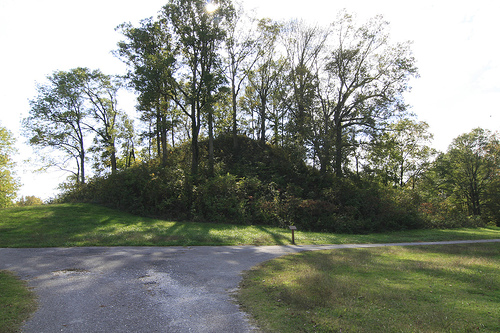
Educational family vacation to Pinson Mounds and Museum. Pinson, TN.
(*photo credit)
February 9, 2011 Vacation
by Reducing the Carbon-Print
Challenge:
Can vacation time be made ever more green?
As
the days lengthen and the thought of spring ahead comes to mind, let's start
thinking about vacation time with relatives and friends. Consider how we can
couple any trips with other activities so as not to apportion the entire use of
fuel to one exercise. Yes, apportionment is key. One recent essay that we
decided to suppress involved calculating the hoofprint of air-shipping show
horses from overseas to the World Equestrian Games in nearby Lexington,
Kentucky. It baffled us as to how to apportion the energy expenditure among the
reported half million visitors. Really if only a few were present, the fuel use
would be extravagant, but large numbers tend to justify energy expenditures.
Suggestions
for green tourism are found in Ecotourism in Appalachia: Marketing the
Mountains (Univ. Press of Kentucky, 2004) co-authored with the late Kristin
Johannsen. Some include:
*
Social action. Combine vacations with charitable acts of helping repair
buildings or relieving caregivers so that they can have time off for their
personal well-being. Perform works of mercy, e.g., visit the sick or feed the
hungry.
*
Agritourism. New and different working experiences can be a hallmark of
some vacations. Quite often youth (and adults as well) get much out of
opportunities to assist in work that is radically different from urban life, and
this gives them the chance to meet new people and expand their work experience.
*
Education and religious travel. Occasionally, intellectual and spiritual
well-being may justify increased travel. The justification is due to benefits
gained. Many discover that gathering information on family history is a
learning experience.
*
Closer to Home. We need not travel great distances except on rare
occasions, and so greater frequency of local targets works better and takes far
less stressful travel time. Besides, such vacations cost less and stimulate
the economy of local places.
*
Multiple persons. Nothing reduces auto travel resource costs more than
increasing from one to two or two to three or more people per vehicle. Think of
it! Air travel savings are far less however, because the flight is already
booked.
*
Alternative travel modes. Biking, canoeing, boating, hiking, and
mountain-climbing are vacation modes that create virtually no carbon imprints
except for motoring to or from the hiking routes.
Prayer:
Lord, teach us to make our vacations ever more green; help us to consider
more travel companions, our modes of travel, length of trips, and multiple
purposes during anticipated trips.

A young seedling emerges amidst competition on the forest floor.
(*photo credit)
February 10, 2011
Competition or Win/Win Approach
Challenge: How can we
purge the world of winners/losers?
Such
a question goes against everything our competitive culture, our school systems,
our athletic programs and our professional sports industry profess. You are not
only disloyal to raise the question; you are downright treasonous. What would
we do about million-dollar contracted baseball pitchers or quarterbacks? What
about all the fans who come out to drink beer and threaten to throw empties at
umpires or referees? What about the youth who seek college scholarships in
swimming or track or football? What about the efforts to train graduates for
success in a competitive business world of winner-take-all?
Winner
pays all. One possible alternative would be for the winner to buy beer or
perform needed service to or for the loser. Just losing requires the human
balance of good sportsmanship, so losers are the ones in need of special
attention. Really this attending to the loser comes closer to the Scriptural
model of washing the feet of others, of going the extra mile, and of doing
loving service for the unfortunate. Losing is unfortunate, for winning is its
own reward; the losers are the needy of the world. Looking out for them could
be a better twenty-first century goal than human-style dog fights or bull
elephant mating struggles.
Be
first in responding. A second approach is to see winning not in beating
another, but in being the first to give service to others in need. Here winning
is not a conquest but consists of leading the way, with hopes others will
follow. First in sensitivity and in time and not in physical prowess or luck or
mental agility is something to be truly competitive about, and it makes good
sense as well. Number one in sensitivity to the needs of so many losers in our
culture is a countercultural effort to challenge a dysfunctional system. It
sure beats conquering another by athletic or intellectual skills.
Champion
win/win games. Several of our family were tired of regular Scrabble,
and so we teamed up and tried to fill as many of the spaces on the board with
lettered words that could fit; the objective took interactive cooperation. In
fact, we enjoyed the exercise for there were no winners and no losers. We all
took part. The competitive ones in the family thought the exercise was a little
crazy, for how could one live without winners and losers. Later I discovered
that the exercise was not so novel after all. Some folks strive to have win/win
games; they enjoy celebrations, folk dances and other festival activities where
all win. Can't we conquer mountains as a team, not by competition? Why must we
seek to always come out on top, or is this an implicit reinforcement of a
dysfunctional economic system demanding approval of a disparity of wealth where
the privileged are winners and the rest losers?
Prayer:
Lord, teach us to strive for the benefit of all and not tolerate a world of
winners and losers.
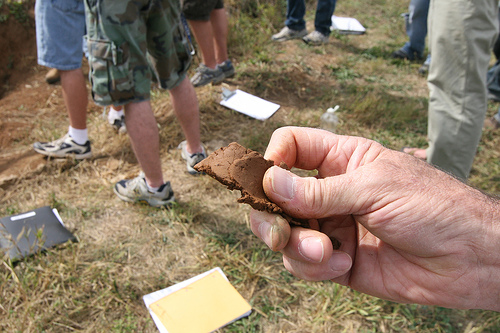
Examining the texture of soil taken from a pit near Lexington, KY.
(*photo credit)
February 11, 2011
Geothermal Energy: A Stimulus Package Success
Challenge: Can energy
stimulus money be well expended?
On
the 163rd birthday of Thomas Edison, our thoughts turn to electricity. We learn
about energy-efficient innovations to some of Edison's applications (better
light bulbs). Solar and wind are coming, but are intermittent and still have
cost and siting hurdles. A lower cost and virtually environmentally benign
source (when compared to coal, petroleum and natural gas, and even biofuels) is
geothermal (see July 8, 2006; December 22, 2007; and December 17, 2010). The
recent Stimulus Bill has allowed projects to receive Federal grants of 30% of
investment costs or $363 million in on-time U.S. Recovery Act funding for
geothermal energy.
This
superior renewable energy source is being exploited especially in California and
Nevada (but also Alaska, Arizona, Colorado, Hawaii, Louisiana, Mississippi, New
Mexico, Oregon, Texas, Utah, Washington, and Wyoming). However, much of the
nation has some potential, but often at higher drilling costs. Even West
Virginia is supposed to have a staggering 19 GW of geothermal energy. Many of
these new geothermal sites are now being built (31 in California and Nevada,
generally in the 10 MW to the 70 MW range). The new plants taken collectively
are reported to amount to 7,875 MW (source: <Alternative Energy Newswire.com>
November 2, 2010). Added together, the effect will be a rapid coming on line of
the equivalent of eight nuclear powerplants costing at least sixty billion
dollars and taking at least a decade to build. Let us recall that geothermal
energy received virtually no funding during the Bush administration and is still
minimally funded in contrast to the perks given to fossil fuels production.
Let's
recount the advantages of geothermal energy sources:
* cleaner air that
does not have unmanageable pollutants and an added load of carbon dioxide;
*
energy supplied at 3-5 cents per kilowatt hour and without large-scale loans in
times of fiscal troubles;
*
safety without the need of guarding nuclear powerplants and ultimate nuclear
waste or coal ash disposal facilities;
*
a continuous source without the worrisome intermittent characteristics of clean
solar and wind energy;
*
dispersal of sources over a wide geographic range that actually includes
virtually all of this nation; and
*
ease in construction and maintenance in comparison to many high cost fossil fuel
or nuclear powerplants. Minor air and water pollutants from geothermal
generation are controlled at low cost.
Prayer:
Lord, make us a frugal people who find advantages, and make every effort to
have these work for the common good.

Garden plot for corn, in winter.
(*photo credit)
February 12, 2011 Make
Personal and Family Gardening Choices
Challenge: Can we
encourage personal gardening decisions?
People
like to make free choices, for it brings our their personality and allows for
more relaxed gardening. When the tool- makers and merchants say you MUST have
this implement, our choices are constrained. The commercial pressure extends to
fertilizers and seeds and various soil conditioners. Much should still be
personal choice and so we present five items here:
1.
Grow what is healthy and you like to eat. Perhaps you have discovered
the benefits of greens and salads. These grow in great variety, and with
tender, loving care we can extend the growing season in both spring and autumn.
The variation in mixture, alone with herbs such as dill or parsley, can generate
ever new arenas of taste. Furthermore, tomatoes and raw root veggies add
nutrition and fiber. Expand your choices by reviewing seed catalogs.
2.
Grow what is more naturally suitable. From growing experience or
suggestions of immediate neighbors you can learn about a variety of choices that
do surprisingly well in your own particular soil and microclimate. However,
these may differ in barriers or trees or drainage characteristics from the
neighbor's. A store of personal gardening experience is the best choice.
3.
Grow to avoid or dissuade wildlife. Most know today's America has an
abundance of "wild" turkey, deer, goose, rabbit, raccoon and squirrel. These
can determine what is grown in rural, suburban, or urban gardens. Some people
protect by proper barriers and fencing; others dissuade wildlife by spraying
hot pepper spray; still others by planting a border of plants the wildlife truly
dislike. Some veggies such as okra, onions, peppers or spicy herbs have few
wildlife takers -- and ought to be given higher priority where pests abound.
Consider wildlife-edible landscaping to divert the attention of the hungry
wildlife.
4.
Grow what can be used now or preserved. This includes produce that one
does not tire of quickly, and that can be given, exchanged, or sold at the
proper season. Sometimes it is a little-known crop like kohlrabi or pac choy;
often it is the early start or late production outside of traditional seasons
(again, salad greens are a choice). Go easy on zucchini when everyone else's is
in season. However, some that are good candidates for preserving such as
cucumbers (in my case), are worth extra effort.
5.
Grow something different each year. Gardening ought to be always a
learning experience, and so prepare for the best by growing a new variety that
expands our sensory experiences and learning base. Salsify (oyster plant) may
be a new choice this year, especially if you are shying away from expensive
shellfish.
Prayer:
Lord, let us gardeners find the space in our lives for wise and wholesome
choices -- and to teach others the same.

Clothesline on ice.
(*photo credit)
February 13, 2011 Realize a
Growing Responsibility to Be Like Jesus
I
have come not to abolish the laws and the prophets but to fulfill them.
(Matthew 5:17)
Challenge:
How do we become more discerning in today's world?
These
are times that try our souls; the demands are for a growing watchfulness and
listening. Fulfillment of the law and prophets means going beyond the letter
and fortifying our spiritual life. Growth in perfection takes us closer to
Jesus in prayer and alertness to possible service. We find that obedience to
the letter of the law in not the end all; we have valuable work to do. We like
to think we are doing all that is required, but are we? The question forces us
to delve deeper into what obedience really means -- namely obeying the will of
God.
Today's
responsorial says: Give me discernment, that I may observe your law and keep
it with all my heart (Psalm 119:34).
The prayerful request calls for
discernment on all levels of our society. It is not enough as individuals to
keep the basic commandments, if we fail to discern the utter needs of our
neighbor; likewise we must refrain from following allurements all around us. On
an individual level, we need a daily discernment of how well today went, and how
much better we can make tomorrow. A heart sensitive to others' needs must go
along with observance.
Before
us is life and death; whichever we choose will be given us (Sirach
15:15-20). Discernment applies both to the individual seeking to give service
(healing, teaching or works of mercy), and to the community that must choose
life-giving service to its people. Nations and people are not to provide
benefits solely to their members, but to extend the spirit of caring to all on
the planet. Neighborhoods are contiguous, and thus there is a community of
nations and peoples, some of whom prosper and some of whom are deeply hurt.
Haiti stands in prophetic witness in its poverty, a verdant land in the past
that is now on hard times.
Discerning
about local or broader problems should not be so exclusive as to forget the
needs of others -- for this planet is one neighborhood, and the health of some
affects the rest. In order for us to live and prosper, we must accept the
challenge to think about global health care, environmental protection and
drug-free localities. The twenty-first century must see expanding global
responsibility. A limited pie must be more equably divided. Mystery always
beckons us forward. The mysterious wisdom of God that St. Paul speaks of is
what we must discern in the world around us -- and this means taking on the
inclusive love of Jesus for all who suffer and need our compassion.
Prayer:
Give us, Lord, a discerning heart to penetrate the mysteries of your calling for
us -- and to choose life over death. Help us to be sensitive to the sufferings
of others and assist them where and when we can.
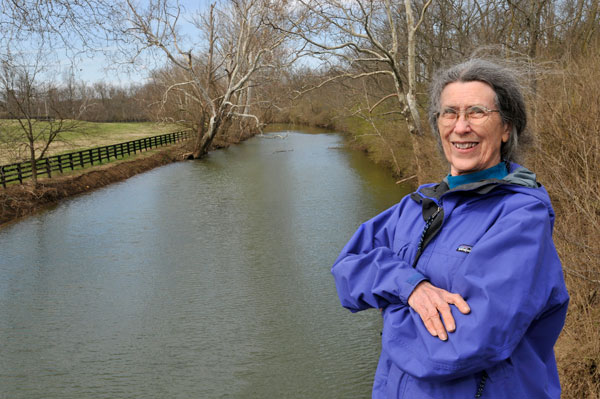
In memory of Mary Byrd Davis. Please click here for details.
(*photo by Paul Atkinson)
February 14, 2011
Express Love from the Heart
Challenge: How can we
grow in heart-felt love of others?
On
St. Valentine's Day, people try to show their new, improved or enduring
love for others in the form of cards or flowers or special gifts. Along with
other gestures on birthdays and special occasions, this has salutary effects for
the one receiving the attention. For the one giving, this day can be a time to
recall the need to express love, the need that is reciprocal and that means to
be open to giving and receiving. However, as in the prayer of St. Francis, we
realize that in giving we receive, and so on this day we need to initiate loving
deeds just as God has done for us in the coming of Christ. We give out of our
heart.
What does it mean to be people with a heart -- since we couldn't be alive
without one. Sure, the heart-shaped Valentine's cards indicate the way we
express love in word and with a promise of extending this to deed. However,
deeds have to go beyond head and hands and include heart; deeds cannot be
allowed to become routine but always be warmed by plenty of compassion. Love
must become part of living, for we know that without it the world soon becomes
heartless and eventually lifeless. As we age and feel the pain of losing
friends and relatives, we realize that our expressions of love and heartfelt
grief to and with others make a great difference. That is not easy but we can
grow in the art of compassion. Through such growth we are enlivened.
For
love to mature, we must pray to love as God loves us -- a prayer of the HEART
for the heart of Christ to beat with us and within us. Expressing love is
difficult, and yet it can be cultivated over time. In fact, expressed love is
the glue that binds us together and gives life to service groups. Amid all the
storms of life, the rays of love shine through as welcome light and warmth.
Especially on this Valentine's Day, we need to pray that we can grow in
love of our neighbors, for a sensitivity to their needs. We extend our love for
those who are forsaken or ill or grieving the passing of a loved one. Our small
successes through deeds should encourage us to continue to pray to have the
foresight and energy to respond to our neighbors' needs.
Love
is a catalyst, a well-placed bit of something that allows for energy to build
and difficulties to be overcome. Love is expressed in many ways, and sometimes
we risk going to the edges of boundaries allowed by individuals or cultures.
However, expressing love may mean taking risks for ourselves and others -- and
that is because love is so powerful, so hard for us to handle. Yes, God is love
and it takes a maturing life to express love more perfectly.
Prayer:
Thank you, Lord for allowing us to live this special day when we reflect on our
expressions of love. Teach us to love others and help us to be compassionate
enough to suffer when they are hurt, to know how to be a balm to ease their
pain, and to be willing to be comforted together with them.
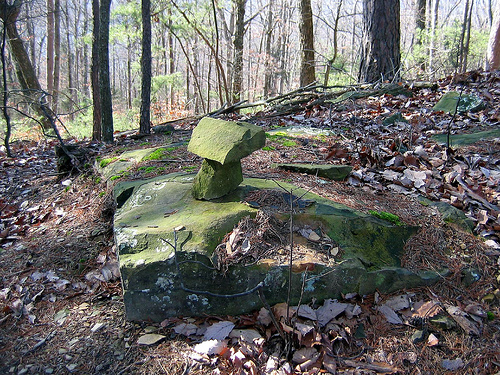
Scene along trail. Bernheim Arboretum and Research Forest.
(*photo credit)
February 15, 2011
Gratitude Heals Our Wounded Earth
Challenge: Can we make
gratitude the spice of spiritual life?
We
become the catalyst of gratitude during a dismal, seemingly never-ending
winter. We ought to list the multitude of gifts given by a loving God. Have
you noticed that thankful people are happier? When we realize our life, love,
and future, we raise our minds and hearts gratefully, and then watch the
barriers that depress us vanish before our eyes. See "Spreading the Ministry of
Gratitude" (9/21/09).
Theological lessons may be
rare after our formal education, but they present themselves occasionally
nonetheless. One that I have found in my pastoral ministry was from an elderly
person who had to receive assisted living and thus had to move from her
independent domestic status. Her family lived reasonably close but only one of
her children helped her move. Loss of independence did not depress her. Though
I could have been irritated that her other children ignored her, still she was
not; rather she was happy with the new apartment and was thankful for her past
independent life. Through her inspiration I decided to expand an ongoing
"ministry of gratitude." Amazing how simple folk are the messengers from God to
us and offer us profound spiritual lessons to follow.
Extending
this mission, we find that our wounded Earth is in need of corrective action;
one of the lacks is the absence of the sense of appreciating God's gifts.
Praise of God, the rising "first light" of our day, must be filled with
awareness of surviving the night and being thankful for a new day in which to
live and serve in many ways. A new February day, brightened by gratitude,
dispels the winter darkness, announces that spring is coming, and allows us to
find service opportunities.
We
are a single pinpoint of light, but a pinpoint nonetheless, and in so being we
act as catalyst to start the healing process of our wounded Earth. Healing must
be given a chance, a spark. If desolation and depression are found in attitudes
all around us, so an infusion of gratitude, the thanksgiving found in the
Eucharist, is the beginning of new life for us and our neighbors. Each act
performed by an individual has some effect, whether good or bad, on the rest of
the total environment. Let's focus on gratitude.
Those
who say that human efforts have little effect on the climate change condition
refuse to accept the powers we have for good or evil. They overlook the
catalytic action of yeast that raises the dough, or the seed from which will
come a great plant. To say that we have little effect on our world can trigger
a deep despair that must be countered by Christian hope. In saying thanks to
God we exercise that virtue of hope and start an Earth healing process that can
spread rapidly and engulf our wounded planet.
Prayer:
Lord help us to say thanks sincerely even when sensing our utter powerlessness
before you.
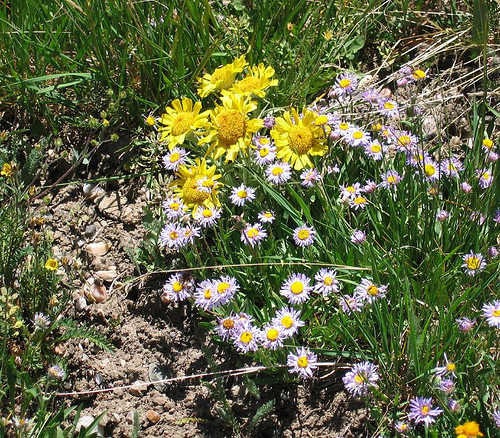
Alpine bouquet. Medicine Bow National Forest, Wyoming.
(*photo credit)
February 16, 2011
Heal Earth: Expand the Frontiers of Soteriology
Challenge:
Is saving our Earth part of salvation history?
Soteriology
is the Christian study of the divine accomplishment of salvation through the
redeeming work of Jesus Christ. One might venture to say that this field was
closed with the Calvary and Resurrection events of two millennia ago. A
challenge comes to us who seek to bring healing to our wounded Earth. Is there
not a saving deed that still needs to be accomplished in which we are party and
even major participants?
Was salvation accomplished from a
Christian viewpoint, or is there still more work to be done in an unfolding of
human history?
One
confined view is that Christ has done all and we only need to prepare for his
imminent coming. St. Paul addressed this view when he told idle, expectant
church members, that they would not eat if they did not work (II Thes.3:7-12).
However, in what does this work or effort consist? It may mean more than merely
being passive about the upcoming event. Does it not include St. Peter's active
"hastening the day of the coming of the Lord"? If our misdeeds have damaged our
Earth (e.g., climate change) and frayed our social fabric, we must make repairs
and join Jesus on an ongoing Calvary that involves suffering people and wounded
Earth. We are to be as compassionate of Jesus. I can do what I can to make
up all that has still to be undergone by Christ for the sake of his body, the
Church (Colossians 1:24). We enter into the saving events in which Christ
invites us, and thus we must make reparation for the wrongs done individually or
by our wayward society.
Christ
has redeemed and is redeeming. Salvation history is unfolding in broader ways
than imagined by our ancestors, who did not know they could affect Earth's life
or death. We enter into salvation's work, not as redeemers, for there is only
one redeemer, but in oneness in the Church with our Redeeming Christ. We are at
the service of the One, and thus at one with his saving deeds. We participate
in saving our wounded Earth and our frayed society. We enter into soteriology's
arena -- not as silent bystanders awaiting a coming, but by helping to prepare a
New Heaven and New Earth.
Prayer:
Lord, help us to Ask Soteriological Questions --
Christ saves us
all, we say,
and is
that the total message's worth?
Is all saving a
matter of Christ's sole action?
Or do we
help save our wounded earth?
What is this
our imitating role:
Securing
what in theory is already gained?
Proclaiming a
deed that will unfold?
Or adding
chorus to a grace-filled refrain?
Is presumption
saying Earth will be saved?
And despair
saying it will not?
Or is hope's
mission what Christ's members say:
"Earth will
be saved, if we but.."?

Red-bellied Woodpecker, Melanerpes carolinus.
(*photo by Sally Ramsdell)
February 17, 2011
Review Disaster Supplies
Challenge: Should we be
prepared for disasters?
I live downwind from the
Bluegrass Army Depot with its store of aging chemical weapons -- though the
place has never had a disaster. In our county, all residents receive a yearly
calendar containing evacuation routes and other information. Allow me to share
that calendar's "Family Disaster Supply Kit" with its five basic areas for all
of you who may have to endure other emergencies. I keep many of these supplies
on standby both in my residence and a set in my vehicle.
Water
Store a minimum of one
gallon of water per person per day.
Food
Ready to eat canned,
smoked or dried meats (beef jerky).
Canned, powdered or
crystallized juices.
High energy food like
peanut butter, crackers, nuts, or nutritional bars.
Prepackaged foods that
have a long shelf life and don't require cooking.
First Aid Kit
2"
sterile roller bandages (5).
2" and 3" gauze pads (8-12
of each).
Adhesive tape.
Scissors, tweezers, needle,
and safety razor blade.
Bar of soap, antiseptic
spray and ointment.
Moistened towelettes (8-10
individual packets).
Tools and Supplies
Paper
Battery-operated (or solar)
radio, flashlight, and
extra batteries.
Non-electric can opener and
utility knife.
Clothing and bedding
(blankets and sleeping bags).
Plastic
sheeting, duct tape, scissors.
Hat, gloves, sturdy shoes or
boots.
Emergency literature.
Special Needs Items
Baby
formula, diapers, bottles.
Medication (prescription
and/or over-the-counter).
Eye glasses or extra
contacts.
Identification with
important papers (birth certificate, etc.)
---------------
Prayer:
Lord, help us to be prepared for disasters and to encourage our neighbors to do
the same.
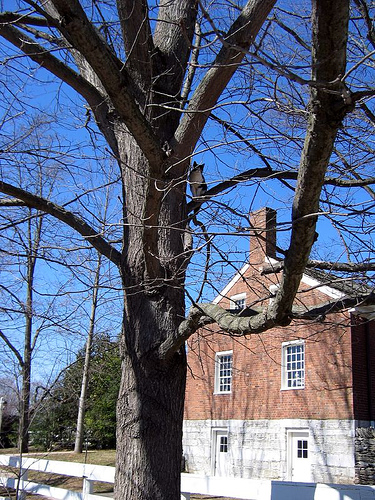
Kitty to be rescued from tree? Shaker Village of Pleasant Hill.
(*photo credit)
February 18, 2011
Multiply Random Acts of Kindness
Challenge:
Ought we to do at least one kind deed each day?
Katrina
Eggert, MM tells the story that in Taiwan on her daily errands, she would pick
one or two fragrant and beautiful flowers that had fallen to the ground from a
plumeria tree. One day she came out and found the ground covered with
blossoms. To her surprise the night watchman said he noticed her pick up one or
two and so he confessed, "Today I shook the tree for you so you would have lots
of blossoms" (Maryknoll, November, 2010, p. 7).
Accept
kind acts willingly. Acts of kindness done to each of us are overlooked or
regarded with only slight acknowledgment. Ought they be more than that? Can we
not see that these acts are making the world a better place and that each act in
some way repairs damage done all around us. A courtesy can be quickly accepted
and so our thanks become an act of kindness and inspire us to find opportunities
to reciprocate to the giver or others.
See
kind acts as spiritual investments. On this Random Acts of Kindness Day
we ought to venture beyond the opportunities that avail to each of us and
realize that healing needed by our troubled Earth includes encouraging others to
perform acts of kindness. Kind deeds are acts of sharing of what we have deeply
within ourselves, our hearts. Our love within our hearts goes out to others and
magnifies their good will. While some strive to invade the commons, the kind
act is part of reclaiming it for all.
Highlight
random kind acts. When children or adults do kind deeds for others, show
appreciation and tell them how good it is, and how much that kindness enters
into the entire world of good. This kindness by others becomes the catalyst
for their associates and neighbors to follow. Kind deeds are investments in the
spiritual economy of the planet. Jesus affirms this by saying that giving a
single cup of water to another will be rewarded. A smile is a simple and
valuable investment, and other deeds too.
Champion
both random AND orderly deeds. Kindness is so often shown in hospices,
hospitals, senior citizen centers and in places that care for others in some
way. Other institutional groups have their own prizes, medals, rewards, and
celebrations for people so often unnoticed in their ranks. These can become
formal acts of kindness that require an effort at preparation, especially when
they become surprises to the recipient. Yes, formal planned acts can be
spiritual investments. Therefore, it is not the randomness that is so
beneficial, but the care needed to provide opportunities that are so unexpected
by the recipient. Being sensitive to the occasion allows more than a single act
to be done. Fill in humdrum cracks of life by doing a kind deed whether planned
or unplanned.
Prayer:
Teach us Lord to see the little things of life as important, even our random
acts of kindness. Help us find opportunities to lay foundational stones for
healing our Earth.

Warm sun to melt away the winter chill.
(*photo credit)
February 19, 2011
Contrasumers: Moving Towards a New Economy
Challenge:
Does Solar System Day usher in a new economy?
Is
"contrasumer" an invented word that is anywhere near being part of the English
vocabulary? Hardly, since it is contrary to our state or global religion of
capitalism. Why look at the contrasumer one more time, since we told the
history in the reflection of March 22, 2010, "Redirect the Contrasumers"?
We need positive actions, not simply opposition to wanton consumption. Today is
the 1876th Daily Reflection of this series and our book The Contrasumers: a
Citizen's Guide to Resource Conservation (Praeger Publishers, 1974) compared
the consumer life of the upcoming bicentennial in 1976 with that of people in
1876. Now a third-of-a-century later we really need models in confronting
consumption patterns in this country and world.
Suggesting
simple lifestyle techniques does not guarantee success. We presented 99 Ways
to a Simple Lifestyle; they included the techniques in gardening and solar
energy that we promoted at our resource centers and through our book, Healing
Appalachia. However, what we failed to address was that the usual lifestyle
is not a rational process performed by consumers but an addiction, a global
addiction that is difficult to address. Talking to the choir does not address
addicts on Main Street. In fact, addiction to consumer products is not
rationally addressed by addicts. Rules and fair taxes can curb excessive
consumption.
Contrasumers
realize that voluntary change patterns have limitations in a world of
allurements and advertising. They see that terrorism and violent revolution are
no answer. The wealthy have access and influence on lawmakers, and power to
preserve their ill-gotten gains through mischievous behind-the-scenes
manipulation of the legislative process. Contrasumers must exercise their civic
duty to save our planet through similar astute activities. Our dysfunctional
economy rests on the premise that the wealthy can consume as they like -- or
invest as they like. However, money, if taxed from the rich, can go for
construction work and small farm subsidies and loans to the poor -- far more job
bang for the buck.
Fair
taxes are one way to readjust consumption patterns. We still need massive
amounts of building materials, foods for the hungry, and all the equipment and
facilities for proper health and education. But we do not need the luxury forms
of consumption that waste materials and pollute a world. Unregulated
consumption is a form of tyranny oppressing the poor and spreading a terrorism
of hunger. An insensitive middle class wants the life of unregulated
consumption, but unnecessary extravagance enhances pollution and environmental
damage. For better or worse, our current economy assumes that the unemployed
and hungry will remain in their place while privileges by wanton consumers
persist. Contrasumers call for non-violent alternatives initiated by the
non-addicted.
Prayer:
Lord, may we confront addicts of wanton consumption.

Colors of sunset, silhouettes of winter.
(*photo credit)
February 20, 2011 An
Eye for Eye and a Tooth for Tooth
Give
to anyone who asks, and if anyone wants to borrow, do not turn away.
(Matthew 5:43)
Challenge:
Can we find just ways to structure the economy?
Loving our enemies and doing
good to them replaces the natural impulse to show revenge whether to an
individual or a nation. The ancient maxim (an eye for an eye...) had its place,
and yet is often misinterpreted; this is not license to continue a dog fight,
but a restriction on the response of kind: don't break someone's arm because he
blackened you eye, whether inadvertently or in a fight. Jesus teaches us to
look at things from another level, namely, "Love your enemies." This is really
a deepening of the Old Testament command to be holy because God is holy. You
shall not bear hatred for your brother, in your heart...You must love your
neighbor as yourself. I am the Lord (Leviticus 19:1-2, 17-18). We hear the
refrain from Psalm 103, The Lord is kind and merciful.
Because
of our need to be holy and godly, we must see the arena of love extend from
local neighbors to more distant people, even our enemies. Where would be the
economy of war or the need to self-defense? A just world order demands correct
relationship, that is respect and civility. However, love reaches out to a
broad horizon, something beyond the litigious nature of correct relations among
people. If you step on my toe I will sue, and I've more money to hire a lawyer
than you.
Jesus
calls us to go beyond and widen the world order to work better for all people.
Giving to another more than his or her "due" is really at the heart of his
message. We see the beginnings of a redistribution of global resources from
those who want to those who need. Let's concede that those who
need have service needs, including proper assessment of needs, finding the right
things or people to satisfy those legitimate needs, and protection to carry them
out successfully.
Today
begins Brotherhood-Sisterhood Week, and we are astonished that Jesus
tells us not to turn away those who wish to borrow. At the heart of this is the
message that we ought to give from the depth of our collective hearts and to
question a system that fosters excessive loans as a business. That some have
much and others must beg or borrow needs a radical challenging. We must set
about making a new world order where the commons is reclaimed, not borrowed with
interest by some from the privileged. Jesus gives us no justification for the
grand capitalism that oppresses so many of the world's poor. Jesus calls us to
a more perfect state, and the challenge is to break from the locked step of this
current dysfunctional system. If we truly love the rich, who could lose their
souls in current practices, we ought to liberate them from the chains of their
oppression -- their wealth.
Prayer:
Lord, help us to know your teachings and apply them.
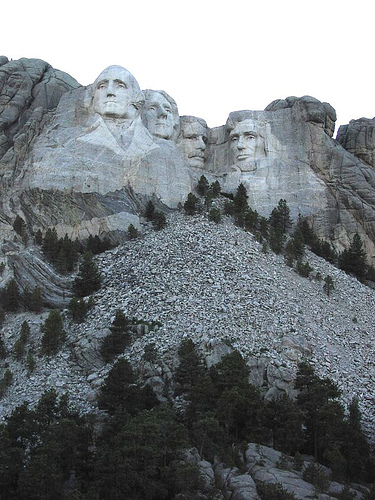
Mount Rushmore, a tribute in stone, primarily granite.
(*photo credit)
February 21, 2011
Presidents' Day: Expand the American Dream
Challenge:
Can we afford to dream what benefits all for the common good in this
twenty-first century?
Our
dreams ought to include the welfare of our people, especially on this Family
Day. In the campaigning leading up to the 2010 elections, many candidates
and supporters mentioned "The American Dream." From their conception of this
vague and unformulated image of the immigrant's ambitions and goals, the result
is something quite individualized (the freedom to make money or fame),
materialistic in goals, or limited to families succeeding. In fact, on this
Presidents' Day, the dreams of both Washington and Lincoln were far more
noble and expansive -- revolutionary independence and a nation where equality
reigns.
A
Federalized World. George Washington's dream was a united group of states
that formed one nation in a federal sense. We have seen this accomplished
through years of struggles, and especially the very trying period leading up to
the Civil War in 1861. That first phase of going from These United
States to The United States was that of Henry Clay and others who strived
for, defended, and preserved a fragile unity. We need to expand that dream in a
globalizing world and thus not these united nations but one United Nations
with the revisions in voting and updated Security Council membership. Few
other nations have the historical qualifications to press for this point, and
the more progressive Americans ought to proclaim and popularize this dream.
Environmental, economic, and social regulations are needed to achieve global
federalization.
An
Equality of People. Few nations have a history to expand Abraham Lincoln's
dream of a nation of truly equal people to that of a world of people of equal
opportunity. We are called by God to surrender some of our sovereignty to a
higher calling -- in the expanded George Washington dream. We are called
to surrender resource possession and seek acquisition for the sake of the poor
peoples throughout the world -- in the expanded Abraham Lincoln dream.
Both of these require that the Americans who see less government as a blessing
are really betraying the dreams of our great presidents; we also have to see
that those who want to be "me first and the hell with others" are equally
un-American in their selfishness and limited visions.
During
this week we focus on American energy policies. We will strive to see that
unity in governance and fairness in distributing resources can be achieved in
various ways. We need to work on all fronts to bring about a healing of our
troubled Earth, and that means a combination of believers in a new world order
that is fair and just for all the people.
Prayer:
Lord, help us purify our dreams so that they are expansive enough to include
more than our self interests; help us to be public-spirited in what we hope the
world will be (a united and fair one where peace and justice prevail).

Totem near Prince Rupert, Canada.
(*photo credit)
February 22, 2011 Promote
a Globally Just Energy Policy
Challenge: Is a fair and
just American energy policy possible?
A
global energy policy should not be the largesse of the privileged, but should
reflect the fair demands of the poor as well. This ought to include control of
sources and consumption patterns. Such aspirations sound good but how can this
come about? Is the initial stage set by those who have or those who have not --
or is it bridging the simultaneous operations of both groups at the same time?
A new energy policy is truly challenging in its complexity and unspoken goals.
Dividing this complex issue into its components includes: confronting climate
change deniers or those who say such changes as observed global warming are of
natural origin (see Wednesday); exposing unrealistic methods that encourage
business-as-usual energy practices by tweaking the system (see Thursday);
contesting the idea that damage can be corrected by pie-in-the-sky
geoengineering techniques; (see Friday); and proposing corrective measures that
include global regulations, proper subsidies, and fair taxes (see Saturday).
Why
global? We ought to think "outside the box" of our house or community or
state or even nation, for energy policy has ramifications for an entire world.
When we decide to raise the alcohol content of auto fuel from 10% to 15%, we
affect food prices of some of the poorest people, both at home and abroad. When
we decide to continue business as usual, we damage the environment through
excessive emissions of toxic gases and carbon dioxide -- and that affects the
climate of people in all countries. An energy policy by us, the second largest
user of energy, is a global policy and ought to be seen as that. Toxic air
pollution knows no boundary; food prices are globally affected by supply and
constantly increasing demand; energy sources exist outside of one country and
include deep-ocean-drilling with global implications.
Why Fair? Here we
focus on a just energy policy that extends throughout the world. The difficulty
with an energy policy that requires from 50 to 100 billion dollars a year to
solve the climate change problem speaks more specifically to the wealthy for the
resources to initiate the process. Fairness requires that those who made
profits on energy use, but do not pay for the environmental costs, pay the
greater part of the accruing bills. Thus the burden of solution in conversion
from fossil fuels to forms of renewable energy is placed more on some, but the
entire world ought to benefit. A renewable energy transition economy comes at a
cost but that includes reclamation costs for past environmental damage.
Fairness means assigning appropriate costs to culprits and benefits to those who
are in the emerging nations and the so-called underdeveloped areas of the
world. Whether this assignment can be made is doubtful in today's climate.
Prayer:
Lord, give us a sense of the entire world as ripe for the harvest, and help us
to be fair in how we bring about this new renewable energy economy so that
all may benefit.
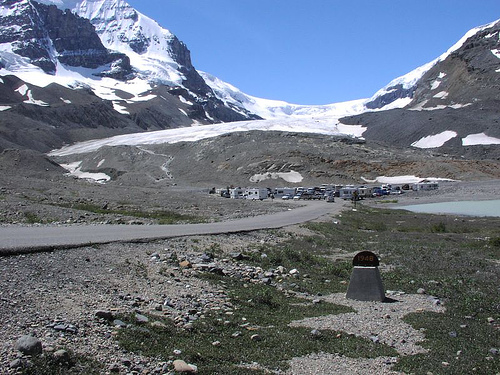
Receding Athabasca Glacier.
(*photo credit)
February 23, 2011
Confront Climate Change Naysayers
Challenge:
How do we address climate change deniers?
Today,
some people still affirm that the world is flat. How do you address them or
those who deny that climate change is of human causation? Through their power
with the media and with money from those who insist on an energy status quo,
they have made this a partisan political issue (see May 3, 2010). Virtually
everyone admits that global warming occurs, but some look for natural causes and
deny basic climate change. It is imprudent to deny what a vast majority of
climatologists say, especially if potential damage to our planet is involved.
Recall that in the 1960s tobacco companies paid the same batch of naysayers to
cast doubt on tobacco-smoking causing severe human health problems. Decades of
corporate profits and millions of smokers' deaths later we know better.
Scientific
evidence leads us to risk erring on the side of prudence. Over 90% of climate
experts tell us that our planet's temperature has risen 0.8 degrees Celsius
since pre-industrial-revolution times. Naysayers know Earth is warming but say
it is a natural phenomenon. Prudent members of the scientific community point
to dire consequences, if the temperature continues to rise by two degrees
Celsius or even more by 2050.
Dr.
Angela Marinoni of the Institute of Atmospheric Sciences and Climate in Bologna
points out that the Himalayas, the "Third Pole" of ice/snow or the "water tower
of Asia," are affected by soot that is accumulating from industrial areas.
Several researchers are finding that glaciers are shrinking as soot in high
mountains covers snow surfaces and absorbs instead of reflecting sunlight (Ref.
The Economist, November 20, 2010, p. 92). A slow melt -- not the rapid
one mistakenly reported by the International Panel on Climate Change in 2009 --
is evidently occurring, but we must note that the slower change is still due to
human causation.
Prudence means careful management of resources at hand. Those who waste or
control resources for selfish gain, are acting contrary to prudence; they
oppose any change in practice that affects their privileged position. On the
other hand, prudent people are willing to err on the side of caution, especially
if our Earth is in danger. We seek a convergence of moral and scientific
evidence even when evidence is incomplete in our imperfect world. The reddening
skies of climate change are the signs of our times. The focus is on "what if
...?" The possible consequences are that the poor will be gravely affected
(billions of Asians depend on the waters of the Himalayas), and conditions could
worsen over time. The fallout from the disappointing Copenhagen Conference is a
naysaying partisan position. However, climate scientists continue to focus on
the long run, not local changes in weather patterns or global warming.
Prudence considers the adverse affects of climate changes on all -- planet
and people.
Prayer: Lord, make
us aware of how to act prudently today.

Eastern milk snake.
(*photo credit)
February 24, 2011
Carbon Capture and Storage: A Pipe Dream?
Challenge:
Should we expose hidden gimmicks that continue business-as-usual in fossil fuel
consumption?
Carbon
Capture and Storage (CCS) is a technology that attempts to capture carbon
dioxide emitted from powerplants and to store it safely underground. This is an
excuse to allow business as usual by coal advocates and has proponents on both
sides of the aisle of Congress from coal states. Is this a pipe dream, for the
price tag on new CCS powerplants would be an additional one billion dollars?
The current advantage in price of coal for fuel would be wiped out in the
installation -- if the technology would even work. The Norwegian Government
with its petroleum money surpluses has been a top spender on CCS and yet last
spring postponed the first full- scale plant by four years. Likewise the German
environmental community disagrees over whether to promote this technology or to
abandon it (Reference: Acid News, September, 2010, p. 9).
Many
doubt whether CCS will ever be installed in Europe or elsewhere in the world on
anything more than an experimental scale. The coal industry will not implement
such expensive practices -- but boasts that it could if need be. Some in the
environmental community see CCS as the escape route for coal when they are
convinced that we ought to be on the road to a total renewable energy economy.
All know that at least one new coal-fired powerplant comes on line somewhere in
the world each week (many in China) -- and the pace seems to be quickening with
continued low coal prices and relatively high-cost renewable energy
alternatives.
Coal
still competes with plentiful supplies of natural gas made widely available
using new extraction methods. Furthermore, nuclear power plants are 10%-30%
more expensive, and current technologies for onshore wind and solar several
times the expense. However, price differences with renewables will narrow,
especially with increased governmental renewable energy support ("Globalizing
the Energy Revolution," Foreign Affairs, Nov./Dec., 2010, p. 112.
Those
who oppose CCS argue that by using this technology other related coal problems
remain. Coal extraction would still damage the environment, other air emissions
would continue along with worrisome coal ash waste materials. Furthermore the
subsidies for CCS could be better spent on renewable energy sources, which
require more than the current $10 billion in public spending. The International
Energy Agency estimates that to cut global greenhouse emission by half at 2050
the world would need to spend $50 to $100 billion each year. Looking beyond
electricity to steel, concrete and other activities, carbon dioxide is still a
problem. CCS may be a longer-term solution, in the cautious words of climate
policy expert Gabriela von Goerne, "if all involved take due responsibility and
diligence." All rests with the serious "if."
Prayer:
Lord, allow us to view possible technologies with an understanding that some are meant
to obscure the need for change.

Blue skies and scattered clouds overhead.
(*photo credit)
February 25, 2011
Geoengineering: Promising or Just Plain Hubris?
Challenge:
Is solving climate change merely geoengineering?
Repairing our wounded planet
goes beyond curbing deforestation and planting trees -- problem enough! Trees
take up carbon dioxide, but they grow slowly, some do not survive, and the
temptation exists to harvest valuable wood and clear forestlands for
agricultural purposes. In order to address growing environmental problems and
yet continue the status quo, proponents propose practices that sound and may be
outlandish. These include "geoengineering" techniques (ideas to fix man-made
climate change):
* Hazing. Imitate
volcanoes that inject sulfur dioxide that cool Earth's surface by reflecting
sunlight back into space. Modifications include releasing sulfuric acid
particles into the upper atmosphere. They would be carried by 80 airships
delivering a million tons of acid per year at about $1-2 billion per year over
an 20-year operational life. Damage would be done to the ozone layer and there
are many complications in that (The Economist, Nov. 6, 2010, p. 99-101).
Warming would be reduced but not climate change. Won't rainfall be diminished
in places? Is this a Faustian bargain?
*
Plankton growing. One CCS strategy is to fertilize oceans with iron
filings to accelerate photosynthetic production. Instead of producing diatoms
with a hard shell (little silicic acid available) that discourage predators, a
softer variety of phytoplankton resulted from the first attempt; these were
eaten by hungry shrimp and no deposited carbon dioxide occurred. Besides, the
iron is an ocean contaminant.
*
Tying up Glaciers. It really sounds outlandish but it is argued that
melt water under ice sheets will lubricate the sliding of glaciers into oceans
and raise water levels. Alternatives include freezing the smaller areas of
greatest danger by pumping out ice water or refreezing with liquid nitrogen.
Really?
*
Cloud whitening. Another far-fetched technical approach is to use a fleet
of remote-controlled, energy self-sufficient ships (between 300 and 1,800) to
spray very small droplets of seawater into the air to whiten and expand clouds.
This would reflect sunlight away from Earth and into space. Yes?
*
Air scrubbers. These are giant CCS mechanical devices that act as space
cleaners and, though far-fetched as far as practicality, are still favored by
some fossil-fuel promoters.
* Liming. This
involves using massive amounts of lime to decrease the rising acidity of oceans
caused by increasing carbon dioxide. However, lime comes from carbonates from
which carbon dioxide has been removed. Again, really?
Geoengineering
ideas make good media coverage, even when "off the wall." While research is
needed, it ought not be at the planet's expense. Can the world afford to become
a guinea pig?
Prayer:
Lord, help us to abandon crazy ideas and keep our minds on energy efficiency and
renewable energy alternatives.

Rustic barn. Anderson Co., KY.
(*photo credit)
February 26, 2011 List the
Elements of a Global Energy Policy
Challenge:
Will we accept reasonable basic principles for a global energy policy that are
just and fair?
1.
Affirm the problem: Accept that global damage is occurring through human
efforts. This reality leads to an authentic spirituality based on the common
good and service to others -- not personal good and self-gratification. People
seek to avoid complex problems and solutions that take extra effort; they want
to believe that problems are not as serious as some would make them out to be.
This is all the more reason that those who sound the alarm will do so in a
meaningful manner that does not exaggerate the problem but yet projects this in
a truly prophetic manner. Those promoting denial and the forces that enhance
denial must be exposed.
2.
Take cautious steps: Use energy conservation and stiff efficiency
standards to avoid wasting fuel in all practices. Permitting wasteful practices
or tweaking the dangerous coal-fueled fuel source only prolongs damage and calls
for more research and development. Geoengineering methods are pie-in-the-sky
with no proven track record, and even partial testing can lead to long-term
disaster. We have to learn to treat our fragile nature with respect, and the
risk-taking that has gotten the human race into this mess cannot be a model for
solving the human-made problems. Where possible R&D funds exist charlatans
abound.
3.
Realize proven reclamation: Weeding out distracting and far-fetched
solutions is challenging enough in itself. Besides preserving forested areas
and all forms of resource conservation, a proven reclamation technique is to
plant trees and reforest all areas where trees can grow. This is a natural and
"organic" approach to solving the excessive carbon dioxide problem -- and does
this through respecting nature, not by forcing geoengineering ideas onto a
gullible world that seeks quick and easy solutions.
4.
Put good practices into effect: This will not occur automatically by
simply knowing better solutions. Favoring renewable energy is a necessity, but
the profitable status quo fossil fuel economy has power. The International
Energy Agency (IEA) says that abolishing $312 billion (2009) fossil fuel
subsidies would boost the global economy, environment, and energy security;
these current subsidies are contrasted with $57 billion for renewable energy
subsidies. Fossil fuel subsidies are not declining but rising to a predicted
IEA estimate of $600 billion by 2015 in contrast to $100 billion for renewables.
Overcoming lobbying power and political pressure exerted by these status quo
industries is a major hurdle. Eliminating fossil fuel subsidies as proposed in
2009 by the G-20 nations would reduce global energy demand by 5% and carbon
emissions by 6% by the year 2020.
Prayer::
Lord, inspire us to move from the present status quo and the failure to see
problems to a willingness to accept good solutions and to bring them into
effect.

Several species of birds share a meal.
(*photo by Sally Ramsdell)
February 27, 2011 Lessons
from Birds: Trust, Freedom, Joy
Look at the birds in
the sky. (Matthew 6:25)
Challenge:
Are we attentive to Jesus inviting us to see other creatures as our teachers?
Our attitudes towards other
creatures are quite varied. We can act as overlords, masters, stewards or
exploiters; or we can find a more humble stance within the arena of all being.
Jesus teaches us to serve and to be attentive.
Trust.
Before our Creator we are like trusting children. We are at the mercy of God,
but so are birds and other creatures. The basic message in Luke's Gospel
passage quoted above is a trust in God who watches over us always and gives us
the confidence to continue on our journey of faith. Birds do not sow or reap.
While we human beings strive to be sedentary enough to sow and reap, we must see
such actions are not the entirety of life. God takes care of us to the degree
that we all ought to share and find sufficient resources -- provided some do not
take what belongs to others. Trust in God inspires us to regard the protective
cloak of providence as an environment in which good may occur. Become the
providence of God to others, and be energized by the Bread of Life.
Freedom.
There is something freeing in doing what Jesus tells us here, for by looking at
the birds we see something that points to our relationship with God, a
relationship of mutual giving and receiving. To be free from sin and before God
we find a fullness of life to move from place to place in our journey of faith.
The barriers can be overcome, and we alight at new places. These winged
creatures that are all about are the constant reminders that God is all present,
and God freely sees and works with us. Birds build nests but after a period of
bearing young they move on and on. They seem to have the freedom of the
hunter/gatherer and yet are willing to sit on a nest to hatch young and then to
patiently teach the nestlings to fly. Be free and teach others to also
venture out and exercise their new-found freedom.
Joy.
Perhaps nothing is more heartening than bird songs when we are sluggish,
distracted or dispirited. Suddenly everything lightens up and the shadows of
gloom vanish, for God gives us the voice of creatures that sing before our eyes
and ears. Joy creeps into the gloom and makes us aware that we are meant for
eternal joy even amid the ups and downs of our arduous faith journey.
Amazingly, impending storms are coming and still the song of birds uplifts us.
Remain cheerful is the lesson, and do this in a public way so others can
see and hear and find joy as well.
Prayer:
Lord, teach us to love the birds all around us, and to see them as meant to
teach us the qualities that God gave them. Help us to protect birds so they
will continue to teach us all --for what would a birdless Earth be like?

Warm rays of the sun melt away ice in Kentucky creek.
(*photo credit)
February 28, 2011 Gurgling
Creeks: Nature's Musical Sounds
Challenge:
Are we willing to listen to the sounds of nature that enliven us with special
harmonious music?
Can't
you hear what composers call the music of the stars? How about the resonating
effects from that original Big Bang? Maybe these are somewhat farfetched for
many of us, but what about the birds that stay through the winter or are
starting now to return? Nature has its music, but we have to stop and listen in
order to hear it. When we hike in winter, the sounds we hear are conditioned by
how severe the winter is. With a land still covered in snowdrifts and icicles,
the crunch of the white stuff beneath our boots is a prominent sound. Not so in
snowless climes when even in winter we can hear a gurgling, ice-free creek.
That sound seems sharper in February and is a greeting to our ears, though we
find it quite difficult to spell out the sound we hear.
Onomatopoeia is the formation
of a word that imitates the natural sound that we hear-- and "gurgle" is
supposed to do just that. However, words fail to describe music, and so there
is a gulf between the emotion engendered by a flowing and musical stream and the
spoken language. We need music from various sources, and so we strive to listen
to natural music. More to the point, we need moments to listen and reflect --
and nature beckons us to stop long enough to listen. February is a perfect time
for a little more rest and a little more listening.
Gurgling
streams are like the sounds of someone gasping for breath. They call out as an
expression of life, the life of living water that flows incessantly to the sea.
We realize that only one gurgle in a trillion is appreciated by us, for we are
limited in how much we can take in. But the free gift of natural music reminds
us that there is vastly more for the taking if we but give our time and listen.
Reflections like these are poor imitations, but if these words send us out into
the cold to listen and see what is out there, they are of value.
Prayer:
Prompt us, Lord, to leave these written words and search the vastness of our
universe for music to enjoy and to lift us up to you. It is a world rich in
sounds and impoverished in spoken appreciation.
-------------
Ending to "May God Bless
You: A Franciscan Blessing"
May God bless you
with the foolishness to think
that you can make a
difference in the world, so that
you will do the
things that others tell you cannot be
done.
Reference: Sacred
Journey: The Journal of Fellowship in Prayer (Autumn, 2010), p. 65, <fellowshipinprayer.org>.
|